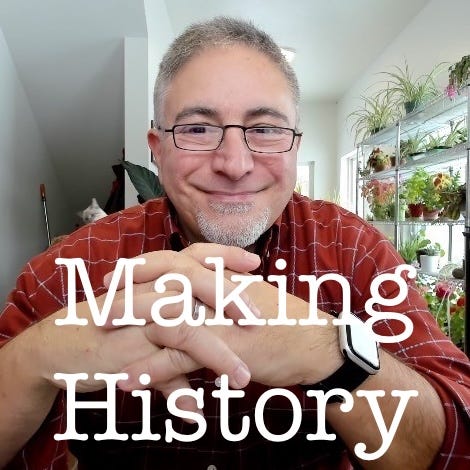Historical Claims in Popular Discourse
As a historian, I feel somewhat obligated to understand and comment on what people are doing with history in politics and the culture today. Sometimes this involves fairly straightforward "fact-checking" which is actually often more "interpretation-checking" or "assumption-checking". Other times, people seem to have created entire industries around promoting a world-view which includes a view of history, where it is not entirely clear how it differs from the ways we typically understand the past, but where those differences are probably very relevant.
I want to be aware that it's relatively easy for people to make stuff up, subverting our understanding of the present by connecting the dots between particular ideas and events in the past. This has been done in the past in memorable episodes such as the "Dunning School" that reinterpreted the Civil War and Reconstruction from the halls of Columbia University. On the other hand, I think often a little subversion is called for, when the master narrative gets a bit out of hand. And I want to be sensitive to the fine line between propaganda and conspiracy theory, versus muck-raking and challenging overly-simplistic national mythologies.
For this reason, I probably read a bit beyond what some other historians might consider "legit" sources. For example, in comparing the Gilded Age of the 1890s-1920s with that of the present, I'm inclined to read a bit more widely. For example, I'd like to understand ideas like eugenics as they were imagined before they became associated with fascism and concentration camps. Not in order to try to revive the ideas, but to really understand what it means when people draw parallels between what was happening in America and in Germany before WWII or claim that the Nazis were just carrying on work that had been begun in America. There may be some truth to this claim, but it may not mean what the people promoting it think it means.
This may seem a bit theoretical, so let me provide a couple of examples of things that I'm unsure about but poking at to see what they are. First, Whitney Webb has written a lot in alternative news media and has recently published a two-book expose that claims to link organized crime, early intelligence agencies, and plutocracy together in both the previous Gilded Age and in this one. She is not on Substack although a lot of people talk about her here. I'm not enough of an expert on the events in the second volume (which is much more about Maxwell and Epstein) to have a solid opinion about when correlation suggests causation. But I find the connections she makes in the first volume and the people she highlights are really interesting. It's worthwhile, I think, to consider how someone like Samuel Bronfman imagined legality and nationalism. A Canadian operating in the liquor industry which was first illegal in Canada and legal in the US, and then arbitrarily flip-flopped. What would you think?
So there are some interesting threads to pull, even if I don't want to follow them where Webb does. Similarly, there's a project that is fairly big on Substack, called the "Canadian Patriot". This has a series of offshoots, including "Breaking History", Matthew Ehret's Insights", and Cynthia Chung's "Rising Tide Foundation". I've watched a few videos and read a few articles, and I'm not quite sure what to make of this yet. At first glance, I suspect it promotes a quasi-gnostic, Platonist worldview that is subtly about normalizing an expanding role for China in the global economy and world affairs. I don't really have an opinion about this -- it seems inevitable that China will become the global hegemon in the 21st century, so I guess we ought to begin thinking and talking about it. And I do think a world history that ignores the perspective of East Asia (as well as South Asia, Latin America, etc.) is incomplete and unhelpful for understanding the present or imagining the future. And I am interested in digging into the history of Western Culture a bit, and unpacking things like the relationship between Ruskin's ideas about Pre-Raphaelite art and how it led to Cecil Rhodes' understanding of imperialism. I'm not so sure about the religious angle. I have to point out, though, that this whole Canadian Patriot project seems like a bit of a juggernaut. It's hard to keep up with everything they're putting out and there does seem to be a bit of a danger that the high production values and sheer volume of their output may just flood the space and overwhelm any chance of engaging critically with their ideas. If nothing else, because they seem to be very well-funded and to have built a team of professionals, while their viewers (and critics) may be amateurs engaging in their spare time.
In any case, I think it's important for historians to engage with people making historical arguments, just as sociologists, economists, and others should respond to claims made in their disciplines. If people find this type of thing interesting, let me know and I'll try to devote more time to it.


